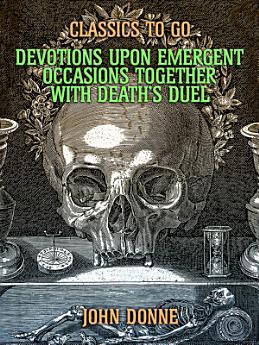Devotions Upon Emergent Occasions: Together with Death's Duel
Jan 2021 · Otbebookpublishing
Ebook
186
Pages
family_home
Eligible
info
reportRatings and reviews aren’t verified Learn More
About this ebook
Devotions upon Emergent Occasions is a 1624 prose wo rk by the English writer John Donne, who dedicated it to the future King Charles I. It is a series of reflections that were written as Donne recovered from a serious illness, believed to be either typhus or relapsing fever. Nathaniel Hawthorne, the great American author, cunningly, informatively, and entertainingly recounts several stories in American history. each story is told by a grandfather to his grandchildren. (Goodreads)
About the author
John Donne (1572-1631) was an English poet, scholar, soldier, and cleric whose works have left an indelible mark on literature and theology. Born into a Roman Catholic family during a time of intense anti-Catholic sentiment in England, Donne's early life was marked by religious conflict and personal turmoil. His conversion to Anglicanism and subsequent ordination as a priest were pivotal moments, reflecting the complex interplay between faith and survival in Elizabethan and Jacobean England.Donne's poetry is celebrated for its emotional intensity, intellectual rigor, and innovative use of metaphysical conceits—extended metaphors that draw connections between seemingly disparate ideas. His works, such as "The Flea" and "A Valediction: Forbidding Mourning," explore themes of love, death, and the divine with a blend of wit and profundity that continues to captivate readers.A master of both secular and sacred verse, Donne's sermons and religious writings reveal a deep engagement with the existential questions of his time. His ability to navigate the sacred and the profane, often within a single poem, has influenced generations of writers, from T.S. Eliot to Margaret Edson.Controversially, Donne's early career was marked by a series of rakish love poems and a clandestine marriage to Anne More, which resulted in his imprisonment and a fall from grace. Yet, this tumultuous period only enriched his later works, imbuing them with a sense of redemption and spiritual awakening.John Donne's legacy lies in his fearless exploration of the human condition, his innovative poetic techniques, and his profound impact on both contemporary and future literary landscapes. His life and works continue to resonate, offering timeless insights into the complexities of love, faith, and mortality.
Rate this ebook
Tell us what you think.
Reading information
Smartphones and tablets
Install the Google Play Books app for Android and iPad/iPhone. It syncs automatically with your account and allows you to read online or offline wherever you are.
Laptops and computers
You can listen to audiobooks purchased on Google Play using your computer's web browser.
eReaders and other devices
To read on e-ink devices like Kobo eReaders, you'll need to download a file and transfer it to your device. Follow the detailed Help Center instructions to transfer the files to supported eReaders.







